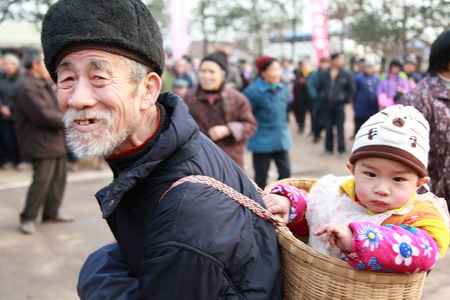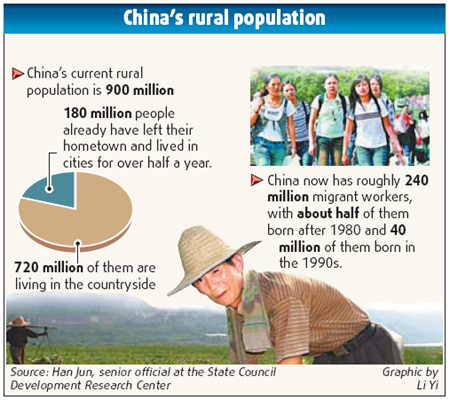Top Biz News
Rural population could drop to 400m
By Jin Zhu (China Daily)
Updated: 2010-02-25 11:11
 |
Large Medium Small |
|
 |
|
An elderly man from the countryside walks in a street in Renshou county, Sichuan province, with his granddaughter on his back, on Feb 4. Renshou county has a population of 1.62 million, with 1.33 million living in rural areas.[China Daily] |
The country's rural population may drop to 400 million from the current 900 million in the next three decades because of rising urbanization, a senior official has forecast.
The rural population currently stands at 720 million, the latest population figures have shown. But the number does not include the 180 million rural residents who have left their hometowns to live in cities for more than half a year, Han Jun, a senior official at the State Council Development Research Center, was quoted as saying by Beijing News.
In the past 30 years, the urban population has increased by 400 million to hit 600 million. Of these people, 27 percent now live in cities but are not permanent residents.
"Currently, one in four residents in the cities come from the rural population. The current movement of labor from rural to urban areas is expected to continue in the future," Han said.
The country has about 240 million migrant workers, with about half of them born after 1980 and 40 million of them born in the 1990s, the latest official statistics show.
"Young migrant workers are reluctant to go back to the countryside and are eager to be new residents in cities," Han said.
| ||||
"Hundreds of millions of farmers are now working for the development of cities and contribute a great deal to tax revenues where they live. However, they cannot enjoy the public services offered in cities. It is not fair," said Zhang Hulin, a professor with the Party School of the Central Committee of the CPC.
New-generation migrant workers mostly live in cities and work as security guards, waiters, construction and decoration laborers, and deliverymen.
"More and more citizens have felt the importance of migrant workers to their daily life. But low wages have also made many migrant workers unwilling to stay and work, especially in big cities," Zhang told China Daily yesterday.
So far, 13 provinces and cities such as Hebei and Liaoning have already piloted a unified household registration in rural and urban areas. But many say the reform falls short of offering benefits in education, housing and social security to the new population, Han said.














